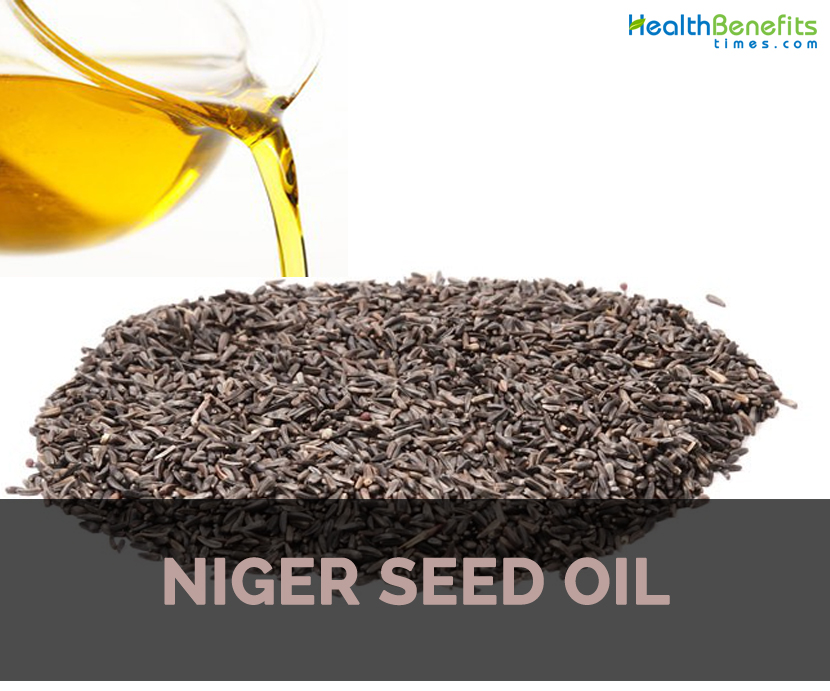| Niger seed oil uses and benefits Quick Facts |
| Name: |
Niger seed oil uses and benefits |
| Scientific Name: |
Guizotia abyssinica |
| Origin |
Native to Malawi and Ethiopia. |
| Colors |
Pale yellow |
| Health benefits |
Healthy heart, Prevent insomnia, Treat skin problems, Assist healing, Lowers inflammation |
Niger seed oil comes from Ethiopia and is also grown in Malawi and India. It is scientifically known as Guizotia abyssinica. It belongs to genus Guizotia and family Asteraceae. It is also called ramtil, nyger or blackseed. Niger oil has nutritions such as fatty acids and linoleic acid. It is used as a substitute for cooking oil besides its healing purposes. The Niger seeds resemble the shape of sunflower seeds. Niger seeds possess 20% protein and 40% oil with a fatty acid composition related to oils of Compositae such as sunflower and safflower. Other common names for Niger seed are Noog, Niger, Nug, Nyger, Niger seed, Nyjer, Ramtilla, Ramtil, Blackseed, Inga seed, Ramtil, Inga seed.
Health benefits of Niger seed oil
Niger seed oil provides various health benefits that are discussed below:
- Healthy heart
Niger seed oil has high content of Omega -3 fatty acids as well as linoleic acid. It helps to balance the level of cholesterol in the body. It helps to prevent atherosclerosis that prevents heart attack and stroke. It has anti-inflammatory properties that help to prevent strain on cardiovascular health.
- Prevent insomnia
Niger oil is helpful for the people with dementia and insomnia. It affects the level of hormone in the human body. Minerals, zinc and potassium affects the hormones in the body. It promotes the release of neurotransmitters.
- Treat skin problems
Niger seed oil helps to treat skin ailments such as rashes, remove scars, burns and irritation. It has high content of antioxidants that helps to calm inflammation and stimulates the growth of skin cells. Additionally, it prevents infection of the skin that helps to prevent infection of skin that increases immunity from abrasions and cuts.
- Assist healing
Niger oils have minerals and vitamins that stimulate the growth of tissues and cells. It has high content of riboflavin, protein, fiber and Vitamin C that plays a vital role in healing process.
- Lowers inflammation
The health problems related to inflammation such as fever, rheumatism, arthritis, gout and high blood pressure could be helped with the use of this oil. It has anti-inflammatory and antioxidants that helps to cure the problems. Oxidative stress is the main cause for inflammation which should be eliminated by consuming the foods that have high content of antioxidant and anti-inflammatory properties which is available in Niger seed oil.
- Enhance immunity
Niger seed oil helps to boost immunity. It has antioxidants and anti-parasitic properties. It could be used as a substitute for cooking oil.
https://www.thealthbenefitsof.com/health-benefits-niger-seed-oil/
Traditional uses
- It speeds up the healing process.
- It enhances heart health and assists weight gain.
- It provides sound sleep and promotes circulation.
- It helps to lower inflammation.
- It is used as a treatment for other medical conditions and skin ailments.
Precautions
- To remain on the safe side, consult the doctor for use.
- Use it in limited amounts.
- Avoid excessive use.
- Sensitive people might get allergic reactions.
- For topical use, perform a patch test before using.
Niger seed oil facts
Niger seed oil is derived from the seeds of Niger plant. This herb is cultivated for its edible seeds. Niger seeds are small and are black in color. It is also cultivated in the countries such as Mexico, Africa, Brazil, Germany, India and Southeast Asia.
| Name |
Niger seed oil uses and benefits |
| Scientific Name of Niger |
Guizotia abyssinica |
| Native |
Native to Malawi and Ethiopia. |
| Common/English Name |
Noog, Niger, Nug, Nyger, Niger seed, Nyjer, Ramtilla, Ramtil, Blackseed, Inga seed, Ramtil, Inga seed |
| Name in Other Languages of Niger |
Assamese: Gujitil;
Marathi: Karale, Karala;
Hindi: jagni, ramtilla, ramtil;
Nepalese: jhuse til;
Thai: met nijoe (เมล็ดไนเจอร์);
Sanskrit: Kala tilla, Rama tilla;
Bengali: Kala tilla, Rama tilla;
Gujrati: Kesani, Ramtilla, Kharsandi;
Rajasthani: Kala tilla, Rama tilla;
Telugu: Yuosi, Velesulu;
Kannada: Gurellu, Huchellu, Kadell;
Tamil: Kattell;
Latin: Guijotia Abisinika |
| Color |
Pale yellow |
| Odor |
Pleasant |
| Taste |
Nutty |
Comments
comments


